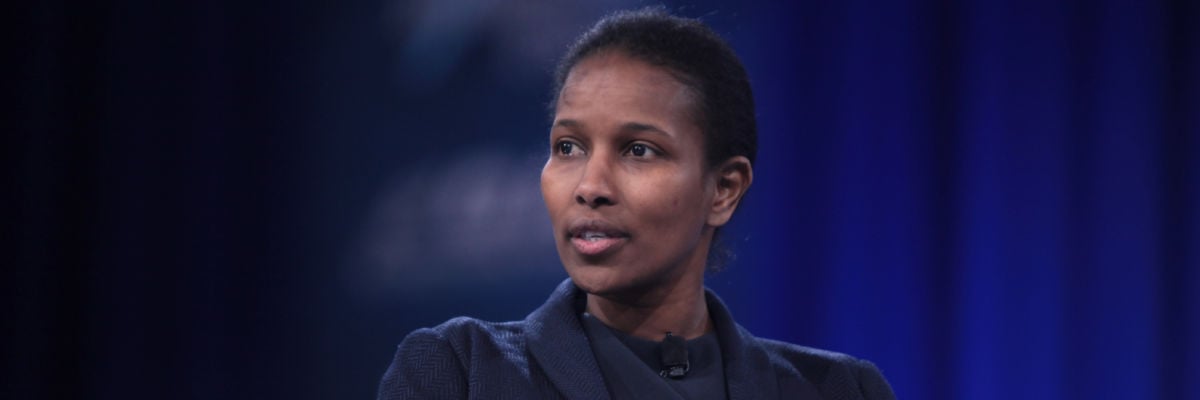
Ayaan Hirsi Ali, a prominent former Muslim turned vociferous critic of the Islamic religion, has now left atheism for Christianity.
“In 2002,” Ali wrote this month, “I discovered a 1927 lecture by Bertrand Russell entitled ‘Why I am Not a Christian.’ It did not cross my mind, as I read it, that one day, nearly a century after he delivered it to the South London branch of the National Secular Society, I would be compelled to write an essay with precisely the opposite title.”
Russell has long been an inspiration for atheists the world over, not just Ali. And though it may seem as though Ali has finally repudiated the reasoning of Russell’s ilk, in fact, nothing about Ali’s account of her conversion to Christianity rebuts Russell—directly, that is. Rather, Ali presents a negative or indirect apologetic.
The “negative” approach to apologetics is this: expose the disastrous consequences of an atheistic starting point, existential or political or both. Ali sounds the alarm against the global threats of “great-power authoritarianism,” “global Islamism,” and “woke ideology.” How to fight them?
We can’t fight off these formidable forces unless we can answer the question: what is it that unites us? The response that “God is dead!” seems insufficient. So, too, does the attempt to find solace in “the rules-based liberal international order.” The only credible answer, I believe, lies in our desire to uphold the legacy of the Judeo-Christian tradition.
Without Christianity—or, at least, “the Judeo-Christian tradition”—to unite us, Ali contends, we have only a bleak and hopeless tyranny to look forward to.
As an apologetical tactic, it’s important to understand both the potential usefulness and the inherent limitedness of the negative way. It is useful insofar as the consequences of no religion are of such magnitude that most people cannot bear to accept them, and so they question the starting point that produces the described result. But it is limited insofar as this approach does not show that atheism is false or that Christianity is true. Maybe a bleak, hopeless tyranny really is all the world has to offer!
Ali contends that atheism is nihilistic and absurdist. Moreover, it has been tried and found wanting: we are reaping the results of discarding Christianity, and they are seriously bad. Secularists promised us one thing; we have gotten quite another.
The negative approach is an obvious way to help the open-minded skeptic set a foot in the religious door. So what else about atheism do many, including Ali, find unpalatable?
First are the failed predictions. Most prominent is the New Atheism’s grandest promise: wipe out religion, and we’ll be living in a utopian sci-fi movie, guided by science and reason. And so who, taken in by these starry-eyed assurances, would have ever thought it believable that we could inhabit a world where discussions about “biological female penises” are on the table, and exploring bizarre sexual fantasies is just another Tuesday? I would not believe it myself, except for the fact that, well . . . have you been on Twitter (sorry, X) lately?
Ali, like many other secularists, discovered that Christianity isn’t the logic-eating monster portrayed in non-believing folklore. Rather, it’s more like the sensible friend who keeps the conversation from going off the rails, a stabilizing agent of rational thought. As an increasing number of secularists are now acknowledging, however reluctantly, the world has started to resemble a frenetic, disjointed plot line—much like the Marvel Cinematic Universe, only somehow worse—correlating strongly with our drift from Christian commitments. Might this be more than mere coincidence?
On the morality front, atheism invites nihilism—the rejection of objective value, meaning, and purpose. Some naturalists resist this implication, but their denial seems to be a flight into fantasy. During my time as a naturalist, nihilism struck me as the only honest, consistent option, the unavoidable consequence of a worldview driven by indifference and Darwinian forces. As atheist philosopher Michael Ruse put it in The Darwinian Paradigm, “considered as a rationally justifiable set of claims about an objective something, ethics is illusory. Morality is just an aid to survival and reproduction.”
Does Ali ever move from the “negative” into the “positive”? Well, there is this:
I would not be truthful if I attributed my embrace of Christianity solely to the realization that atheism is too weak and divisive a doctrine to fortify us against our menacing foes. I have also turned to Christianity because I ultimately found life without any spiritual solace unendurable—indeed very nearly self-destructive. Atheism failed to answer a simple question: what is the meaning and purpose of life?
This part is less “negative” than “without religion, we’re all gonna die,” but even here, the argument is practical, and ultimately still a negative apologetic. She suggests that Christianity is instrumental (if not indispensable) in creating and upholding a civilized, free society; absent its foundational Christian ethos, societal decay ensues. Cut the metaphysical root, and the ethical flower rots.
This line of reasoning has its strengths, since it has appealed to other prominent secularists left scratching their heads in our state of collective schizophrenia, notably Jordan Peterson. Focusing on the political or personal spiritual consequences of adopting atheism is often sufficient to pull people toward Christianity even if they lack any other reason for supposing Christianity is true. But if pragmatic concerns were the end of the story, Christianity would be far less credible, and also far less interesting. Worse for the Christian apologist employing this tool, prioritizing a belief’s utility over its truthfulness reflects the same atheistic-secular-utilitarian perspective that thinkers like Ali and Peterson are calling into suspicion. They just haven’t connected the dots yet.
This is not to presume that Ali doesn’t believe Christianity’s fundamental tenets (such as the existence of God, the Trinity, the Incarnation, and the Atonement)—tenets that have substantial rational and evidential backing—or that she lacks reasons for these beliefs. However, those reasons are not evident in Ali’s essay, and so she does nothing there to directly counter the attacks of atheist critics like Bertrand Russell.
Obviously, most people do not think nihilism is true. Our commonsense intuitions cause us to rebel intensely against the idea that all our moral judgments—about the value of persons, about the inherent indignities and atrocities of slavery and genocide—are somehow on all fours with disputes about preferences of yogurt flavor. The negative approach, then, if successful, sets up the following: one worldview, atheism, forces an elimination, rather than explanation, of commonsense morality. Another worldview, Christianity, does not. Take your pick.
By itself, this indirect apologetic does not prove Christianity or the existence of God; it merely highlights the consequences, presumably catastrophic, of a godless worldview. Still, the negative way is not without merit, since many people will connect the dots, if only implicitly, as follows: the world is not meaningless, senseless, valueless—a void. So atheism cannot be true. If that’s where Ayaan Hirsi Ali is now, then more power to her, and may she take the next step in God’s time.
Image credit: Gage Skidmore via Flickr, CC BY-SA 2.0.



